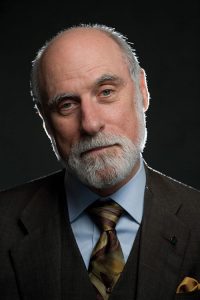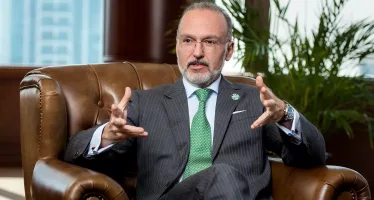Vincent Cerf: Father of the Internet Looking for Ways to Preserve His Work

Vince Cerf had absolutely no idea that his creation would be hijacked by big business, encourage tunnel vision, and spread misinformation. He just wanted to build a medium that allowed for the sharing of useful information.
Cerf and his colleague Bob Kahn, at the US Defense Advanced Research Projects Agency, came up with the Internet Protocol (IP) and the Transmission Control Protocol (TCP) in the early 1970s, technologies that underpin – and made possible – the internet. Later, in the late 1980s, Cerf helped develop the first commercial email system. In the mid-1990s, he was instrumental in setting up the Internet Corporation for Assigned Names and Numbers (ICANN), the non-profit that maintains the internet address book and provides essential co-ordination between regional and national internet registries.
Of late, Cerf has been looking at ways to deal with the risk of digital obsolescence, the potential loss of data saved on physical media or in digital formats, that can no longer be accessed. As hardware and software are subject to constant change, backward compatibility is often lost. The issue has been around since the early 1970s, but so far no solution has been found. Archivists do not usually think in years or decades, but in centuries and millennia. A PDF file that is universally readable on almost any device today, may, 100 or so years from now, be completely unusable.
That has already happened with files saved by WordStar, the text editor of choice in the 1980s which used a closed-data format that is now all but inaccessible. Physical media, such as the first eight-inch floppy disks carrying 80 kilobytes of data launched by IBM in 1971, can only be read by legacy equipment at specialised facilities. The storage solutions offered by iOmega in the 1980s and 1990s – Bernoulli Box drives and Zip, Jaz, and Clik! cartridges – have gone the same way.
Cerf has warned that future historians may be faced with a black hole – a dark age from which almost no records survive. The documents, pictures, and sounds that mark our era can be lost as digital media are abandoned and only fragments are transposed onto new carriers – a process that must be constantly repeated.
Now chief internet evangelist at Google – possibly the world’s coolest job title – Vincent Cerf has called for the creation of a “digital vellum” – a medium impervious to the onslaught of time and able to preserve abandonware and safeguard the accessibility of any file. “We are nonchalantly throwing all of our data into what could become an information black hole without realising it. We digitise things because we think we will preserve them, but what we don’t understand is that, unless we take other steps, those digital versions may not be any better, and may even be worse, than the artefacts that we digitised.”
Cerf proposes going back to basics, pointing out that the human eye and other senses are unlikely to change noticeably. Eyes can still read the stories written on clay tablets and papyrus rolls. Cerf notes that email records of the correspondence between the protagonists of important events will some day have vanished without a trace.
“Today, historians can reconstruct events by finding letters and other key documents that are kept at libraries,” he says. “Important documents will probably survive, but context is often sourced from the writings left by less important actors, commentators, or witnesses. These will undoubtedly have been lost.”
At Google, Cerf may be in the right place to help shape the digital vellum needed to preserve the present. The company has been rather secretive about its efforts, but it is reaching out to partners such as digital art collective Rhizome to develop open-source digital preservation tools.
Vincent Cerf may well father another internet breakthrough.
You may have an interest in also reading…
From Australia to the World – Rupert Murdoch: The Future of Newspapers in the Age of the Internet
Australia is simply not big enough for Rupert Murdoch, though the country did give him his first break into publishing
Costa Rica’s Chinchilla: A Social Conservative
One of two VPs in the previous administration, Laura Chinchilla was the first female president of Costa Rica when she
Constant Improvement, Constant Investment — a Simple Recipe for Banking Success and Recognition
Dedication to good governance and a philosophy of community service have stood Afghanistan International Bank (AIB) in good stead —
















































































